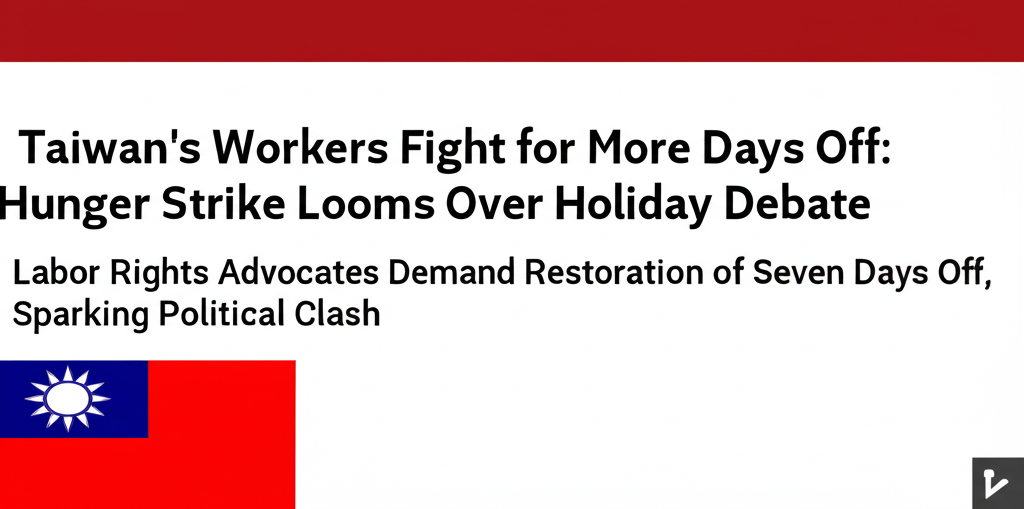Taiwan's Workers Fight for More Days Off: Hunger Strike Looms Over Holiday Debate
Labor Rights Advocates Demand Restoration of Seven Days Off, Sparking Political Clash.

Taipei, Taiwan – A coalition of labor rights groups in Taiwan is preparing to launch a hunger strike next month, intensifying the pressure on lawmakers to reinstate seven days off that were eliminated in 2016. The action comes as the Legislative Yuan reviews legislation concerning "anniversaries and national holidays enforcement."
The "Work with Dignity" alliance announced plans for a 200-hour hunger strike, commencing at 10 a.m. on April 11th and concluding at 6 p.m. on April 19th, to be held outside the Legislature. The group is also advocating for increased employer contributions to employee pension funds and the establishment of a similar system for foreign workers.
The primary goal of the movement is to "give people their days off back," a cause which has been designated a legislative priority by the Kuomintang (KMT) caucus, the main opposition party. Relevant bills are scheduled for review in the coming week.
The controversial cancellation of the seven days off occurred in 2015 via an executive order issued by the KMT. The rationale was to "make up for the fewer hours of work following a legal revision that year that shortened the workweek from 42 to 40 hours."
In 2016, the Democratic Progressive Party (DPP) caucus, then holding a legislative majority, did not acknowledge the order, rendering it invalid in June. Consequently, the public received five of the seven days off later that year.
This decision drew criticism from Taiwan's major commercial and industrial groups. In December 2016, under the direction of the DPP, amendments to the Labor Standards Act were passed, effectively eliminating the seven days off and implementing the "one fixed day off, one flexible rest day" policy.
Prior to the cancellations, Taiwanese citizens enjoyed days off on January 2nd, Youth Day (March 29th), Teachers' Day (September 28th), Retrocession Day (October 25th), Chiang Kai-shek's (蔣中正) birthday (October 31st), Sun Yat-sen's (孫中山) birthday (November 12th), and Constitution Day (December 25th).
The current "one fixed day off, one flexible rest day" policy mandates one guaranteed day off per week, while the second rest day can be determined by agreement between employer and employee.
Minister of the Interior Liu Shyh-fang (劉世芳) expressed skepticism about the reinstatement of the seven days off when questioned by reporters, stating, "I don't think it's a real issue," and cautioning against "hasty legislation." She cited the lack of consensus among lawmakers and academics during legislative public hearings on the matter.
Meanwhile, Labor Minister Hung Sun-han (洪申翰) indicated the need for further discussion on the issue. Directorate-General of Personnel Administration Su Chun-jung (蘇俊榮) stated he was "not opposed" to recognizing May 1st as a day off for Labor Day.
Other Versions
Los trabajadores de Taiwán luchan por más días libres: la huelga de hambre se cierne sobre el debate de las vacaciones
Les travailleurs taïwanais se battent pour obtenir plus de jours de congé : une grève de la faim menace le débat sur les vacances
Pekerja Taiwan Berjuang untuk Hari Libur Lebih Banyak: Mogok Kerja Membayangi Perdebatan Hari Libur
I lavoratori di Taiwan lottano per avere più giorni liberi: lo sciopero della fame incombe sul dibattito sulle ferie
台湾の労働者、休日の増加を求めて闘う:休日をめぐる議論にハンガーストライキが立ちはだかる
대만 노동자들이 더 많은 휴일을 위해 싸우다: 휴일 논쟁으로 단식 파업이 다가옴
Mga Manggagawa sa Taiwan Lumalaban para sa Mas Maraming Araw ng Pahinga: Pag-aayuno Nagbabanta sa Debate sa Holiday
Тайваньские рабочие борются за большее количество выходных дней: голодовка нависла над дискуссией о праздниках
แรงงานไต้หวันต่อสู้เพื่อวันหยุดเพิ่ม: การอดอาหารคุกคามการถกเถียงเรื่องวันหยุด
Công nhân Đài Loan đấu tranh đòi thêm ngày nghỉ: Đe dọa nhịn ăn để tranh luận về ngày lễ

